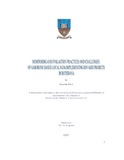| dc.contributor.author | Mark, M. | |
| dc.date.accessioned | 2012-03-21T12:45:48Z | |
| dc.date.available | 2012-03-21T12:45:48Z | |
| dc.date.issued | 2007 | |
| dc.identifier.citation | Mark, M. (2007) Monitoring and evaluation practices and challenges of Gaborone based local NGOs implementing HIV/AIDS projects in Botswana. A Dissertation submitted to the University of Botswana in partial fulfillment of requirements for a degree of Master of Project Management | en_US |
| dc.identifier.uri | http://hdl.handle.net/10311/991 | |
| dc.description.abstract | Botswana is facing one of its greatest development challenges at the moment. It is facing an HIV/AIDS pandemic of immense proportions. It is among the countries in the world that
have been hard hit by this scourge. A lot of stakeholders including government, private
companies, international donor agencies, and civil society have come up with interventions to
respond to challenge of fighting this pandemic. Among the key players in this fight against HIV/AIDS are civil society organizations,
commonly known as NGOs. These organizations play a crucial role of bringing HIV/AIDS
services to the communities where the other players may not reach or may not be effective. The services the NGOs offer to communities are normally delivered as projects. Effective
monitoring and evaluation of projects is usually one of the ingredients of good project
performance and provides means of accountability, demonstrating transparency to the
stakeholders and facilitates organizational learning for benefit of future projects. This study sought to determine how effectively the HIV/AIDS projects implemented by
Gaborone based local NGOs are monitored and evaluated. The study investigated the monitoring and evaluation practices of the NGOs and compared them with the best practices. It also sought to identify the challenges the NGOs faced in carrying out this function. Data for the study was collected using the descriptive survey method where a questionnaire
was administered to project managers and monitoring and evaluation officials of the NGOs. The results of the study show that most of the NGOs (66.7%) were implementing Behavioral Change Communication projects. The study also determined that the monitoring and evaluation practices of the local NGOs fell short of the best practices. Most of the best practices were inconsistently done and others were not done at all. Planning for monitoring and evaluation was inadequately done and inconsistently by respondents. Implementing the
monitoring and evaluation process was not effectively done by the respondents. The study also identified quite a number of challenges the NGOs faced in carrying out monitoring and evaluation of the projects they faced. These challenges made it hard for the NGOs to effectively monitor and evaluate the projects they implemented. The most significant ones included; inadequate finances, lack of expertise, stringent and multi-donor reporting requirements, lack of baseline data. The study made some recommendations in
order to mitigate the challenges faced by the NGOs.
The study found out that, all in all the projects implemented by the local NGOs were not
effectively monitored and evaluated. | en_US |
| dc.language.iso | en | en_US |
| dc.publisher | University of Botswana, http://ub.bw | en_US |
| dc.subject | HIV/AIDS projects, Botswana | en_US |
| dc.subject | Non Governmental Organizations, Botswana | en_US |
| dc.subject | Non Governmental Organizations, Gaborone | en_US |
| dc.title | Monitoring and evaluation practices and challenges of Gaborone based local NGOs implementing HIV/AIDS projects in Botswana | en_US |
| dc.type | Masters Thesis/Dissertation | en_US |
| dc.link | www2.aau.org/aur-hiv-aids/docs/students/mmuzinda.pdf | en_US |

